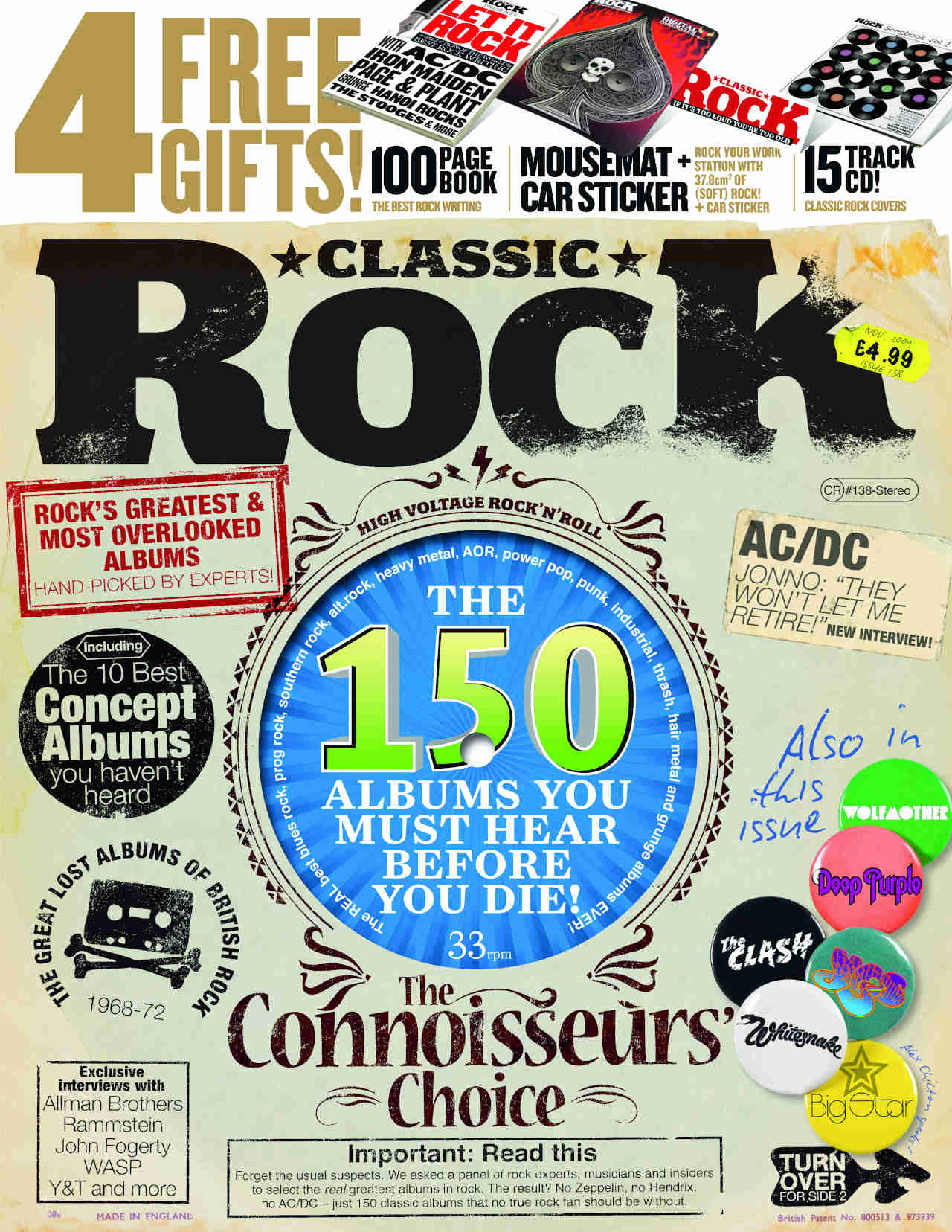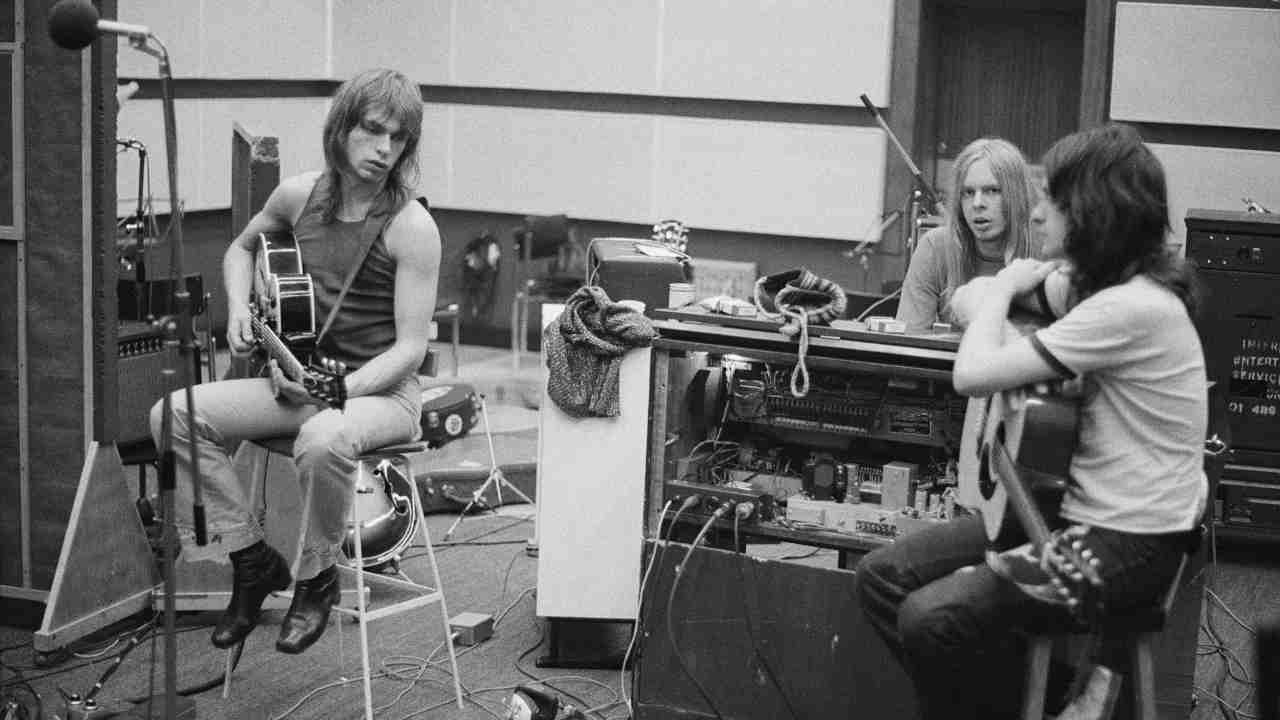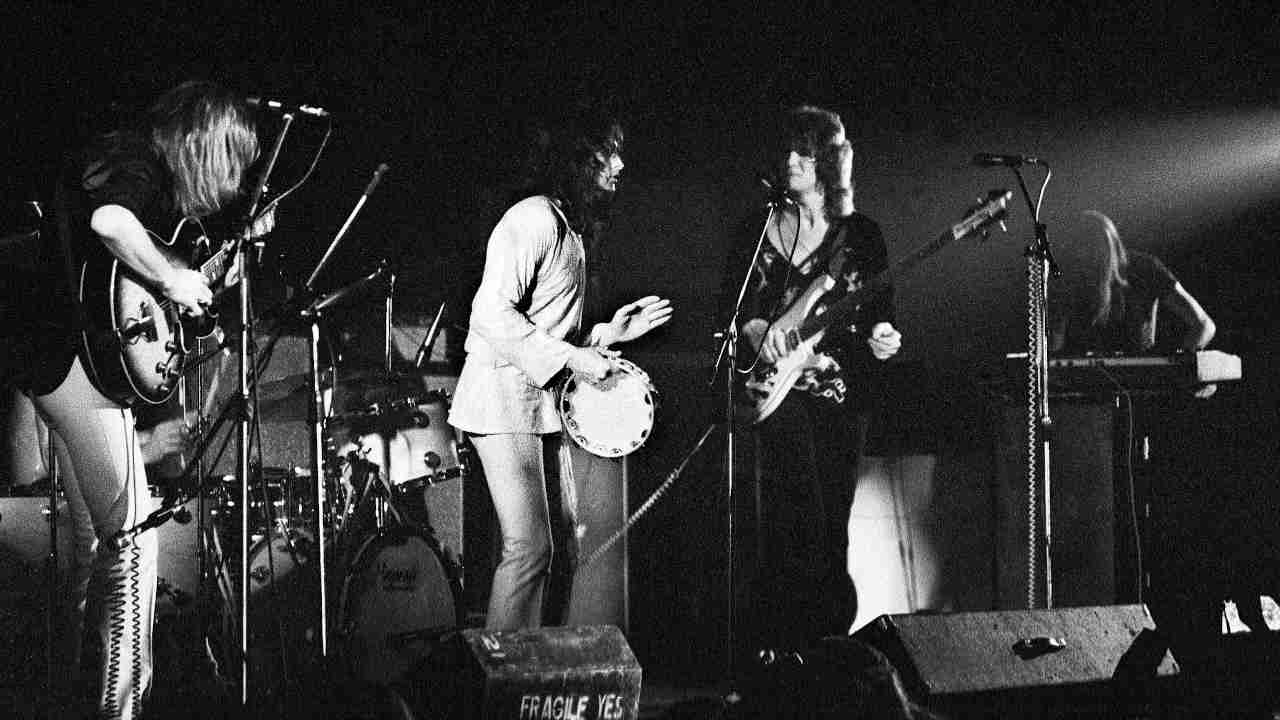Together with King Crimson, Genesis and ELP, Sure have been one of many founding fathers of progressive rock due to the trio of groundbreaking albums they launched between 1970 and 1972 – The Sure Album, Fragile and Shut To The Edge. In 2009, late bassist Chris Squire and longtime guitarist Steve Howe appeared again on two years that modified music without end.
The Summer time of Love was over. The 60s have been petering out, the hippie dream fading like an affordable T-shirt. If the brand new decade wanted some symbolism, then 1970 had the deaths of Jimi Hendrix and Janis Joplin inside three weeks of each other. After Woodstock got here Altamont. In a time that was all concerning the vibes – the brand new vibes have been heavy, the brand new vibes have been dangerous.
But between 1970 and 1972 got here a golden age – maybe the golden age – of rock music in Britain. Led Zeppelin recorded Led Zeppelin III and IV; Black Sabbath made Black Sabbath, Paranoid, Grasp Of Actuality and Vol 4; Deep Purple minimize In Rock, Fireball and Machine Head; The Rolling Stones launched Sticky Fingers and Let It Bleed; Free recorded Hearth And Water, Freeway and Free At Final; Genesis made Trespass, Nursery Cryme and Foxtrot; Emerson Lake & Palmer recorded ELP, Tarkus and Photos At An Exhibition; Jethro Tull managed Profit, Aqualung and Thick As A Brick.
“Issues moved at a special tempo then,” says Sure’s Chris Squire, some 40 years on. “The ‘tour, album, tour, album’ factor was a lot shorter. In these days it was a tour of England, the States, a run all the way down to Japan and Australia and also you have been able to do one other one. Now it takes without end.”
Because the Nineteen Seventies opened, Chris Squire and Sure, the band he’d shaped with Jon Anderson in 1968, have been getting ready to a tasty little run of their very own. In that very same golden interval they recorded and launched genre-defining albums The Sure Album, Fragile and Shut To The Edge.
“We additionally managed to slot in a few line-up adjustments and couple of excursions of America, too,” Squire chuckles. “All in all we have been fairly busy, I suppose.”
Squire had survived a psychedelic dalliance of his personal, enjoying in a band referred to as Mabel Greer’s Toyshop, the place he first met Jon Anderson and guitarist Peter Banks. He’d additionally been in a flower-power outfit, The Syn, across the identical time that Anderson had sung on a few singles for Parlophone beneath the shameful pseudonym Hans Christian.
Sure have been a much less druggy, extra critical proposition from the beginning. Squire, Anderson and Banks discovered a gifted drummer named Invoice Bruford and keyboard participant Tony Kaye and teased out a few formative albums referred to as Sure and Time And A Phrase, made up of band originals and covers.

“Once we have been doing Time And A Phrase, Peter Banks was not very completely happy that Jon and I have been very eager on utilizing orchestration,” Squire remembers. “I suppose that brought on a little bit of a rift and that’s why… it was undoubtedly a musical distinction we had going. We parted methods.
“I frequented the UFO membership and I’d seen Steve Howe enjoying in a band referred to as Tomorrow there and at regardless of the Studying Pageant was again then; the Richmond Pageant, I feel. I’d seen him play on the Speakeasy in a a lot smaller atmosphere along with his personal band. He was undoubtedly primary on my listing. I assumed he was a blazingly good guitar participant. He did take a little bit of persuading [to join Yes].”
Steve Howe had been on the sides of getting someplace. Tomorrow had a minor hit with My White Bicycle, later lined by Nazareth, and he’d rejected approaches from The Good and Jethro Tull whereas in his personal band, Bodast.
“Despite the fact that I used to be solely in my early 20s, I’d been via a number of ups and downs and I’d simply been in a gaggle the place most likely the musicians weren’t as robust as me,” Howe remembers. “I used to be searching for a gaggle the place we have been all equal by way of capabilities. There needed to be one thing proper about this group, as a result of moreover dwelling on the breadline, my music wasn’t getting an opportunity. It was very a lot concerning the inner chemistry. I believed that you simply needed to have that to get issues going. I felt that this was the time for me. I used to be getting observed, and I needed to do one thing that may pull this collectively.”
Howe took a guitar and some results pedals all the way down to Sure’s rehearsal room in Barnes, West London, a small basement house in a home owned by their supervisor.
“I didn’t know Sure, “ he admits. “I’d seen them written about however I didn’t know what they have been about. And though I can’t underestimate how good it was to listen to Jon sing or Chris play the bass, or Tony Kaye, who was very funky on the organ, it was Invoice who made me realise: ‘Hold on, this man over there, how does he play that?’ The group was one I assumed I could possibly be a part of, as a result of everybody shared a really broad appreciation of music.”
Inside weeks, Howe and the remainder of Sure have been out of London and ‘getting it collectively within the nation’, dwelling in an outdated farmhouse in Devon, residence to Langley Studios. The concept was that they’d write an album’s value of fabric and get to know one another.

“I roomed with Invoice and possibly that’s why Invoice and I are fairly shut, as a result of we form of needed to share issues and get together with one another,” Howe says. “The idea was to be a fairly organised skilled musician. I don’t suppose Sure had every other standards. It was a bit like an orchestra: ‘Right here you might be, you play this instrument.’ One of many first issues I performed them was The Clap, and so they mentioned: ‘Nice. Put that on the album.’ That acquired me actually dedicated. I threw in every little thing I had. And I had various instrumental sections, I had the center of Yours Is No Shame, I had Wurm.”
“I suppose we have been all on the same, pot-smoking wavelength,” Squire considers. “That facet of it was lined, actually. We acquired on fairly effectively. The arguments we had have been over music, at the moment.”
But, as Squire hints, the character of the group was rising.
“We didn’t have the bags of all that stuff we ultimately accrued over 10, 20, 30 years,” agrees Howe. “We weren’t overly dwelling in one another’s pockets. We labored in Devon to create The Sure Album. Then we began doing gigs – and we couldn’t wait to get away from one another at occasions. It’s a fiery kind of creature. It’s essential go away and funky down. I don’t suppose we anticipated any massive issues in these first few years, as a result of it was all concerning the music then.”
The Devon periods produced a blueprint for the way forward for Sure. Howe labored his guitar traces along with compositions by Squire and Anderson to kind lengthy, themed items. The Sure Album would characteristic three nine-minute songs: Yours Is No Shame, Starship Trooper and Perpetual Change.
There then adopted what was an odd few months, when, as they ready to report the brand new materials, Sure additionally launched Time And A Phrase, which had been accomplished with guitarist Peter Banks, earlier than Howe joined, however nonetheless with Howe within the photograph on the sleeve. It was a midway home of a report, already outdated by the point it got here out. The Sure Album adopted simply eight months later.
“There may be an odd story about that too, which is form of a stroke of luck, “ says Squire. “When The Sure Album was launched, they’d this postal strike. Again in these days, Fred Bloggs who owned the native report store used to mail in to the report retailer what number of of this they’d bought, what number of of that. On Monday they used to open the envelopes, and the chart would come out on Tuesday. When there was a postal strike there was no approach of getting this info, so that they determined to take the entire of the British charts from Richard Branson’s new Virgin report retailer in Oxford Avenue. Our supervisor, Brian Lane, was straight down there, I’m assuming shopping for an entire load of information. So we went to No.4 within the Virgin retailer, subsequently we have been No.4 within the nationwide charts. And when the postal strike was over, as a result of we have been No.4 within the charts, all of the provincial shops ordered the report. I’m not saying it was dodgy, I’m simply saying it was very lucky there was a postal strike.”

The Sure Album was a High 30 hit in America, the band adopted it on the market, and the brand new lifetime of Sure started.
“There was a kind of private upheaval concerning the time I joined Sure and began to rise to success,” says Steve Howe. “A relationship simply broke up, and it was a really painful one. It was partly as a result of I did begin a brand new life. It wasn’t that I needed to sacrifice it, however I’d all the time sensed that whenever you joined a band you pushed a few of your life away to cope with it. The second Sure actually began to get massive, there was a painful however crucial change in my life. Different folks got here into it and I began a recent one. My spouse Jan, who I’m fortunately nonetheless with, she began with me then and he or she noticed all of it occur.”
“It was very thrilling to go to Sundown Boulevard and play on the Whisky, stuff like that,” Squire says. “I may really feel the vitality of what was happening too.”
Inside weeks of returning to the UK Sure have been headed for the studio once more. However the pace was starting to open additional divides within the band.
Squire: “I don’t know precisely what it was, however there was a scarcity of communication between Steve and Tony Kaye. It appeared like that for the band to maneuver on we would have liked to alter one or the opposite – and Steve was proving himself to be a really useful a part of the organisation. I’d noticed Rick Wakeman. I suppose you’ll be able to say I head-hunted him. It wasn’t simple, it took a variety of persuasion, however ultimately he agreed.”
Wakeman would develop into a power majeure, each for the music and for the band. His willingness to embrace orchestration, his classical coaching and session man’s pace acted like rocket gasoline on Sure’s music. His character added some torque, too.
“To place it blatantly, we have been just about pot-smoking hippies and Rick was a pub man,” says Squire. “A number of the magic comes whenever you knit somebody in who isn’t just like the final particular person. The angle twists and we go off in a brand new path.
“We instantly discovered that, due to the demand, we’ve acquired to get one other album out and we’ve acquired to get it completed in a few months. And in precise truth, from day one to the tip of blending we did Fragile in six weeks. We knew that we didn’t have sufficient organised items to fill an album, so we went: ‘Inform you what. Let’s do our solo efforts and use them as hyperlinks between the band tracks.’”

Fragile was Sure’s first actually nice report, a landmark of progressive rock. Brief on time, lengthy on inspiration, every band member spliced a brief solo piece between three epic songs: Roundabout, South Facet Of The Sky and Coronary heart Of The Dawn. Deeply formidable, surprisingly quirky, gloriously indulgent, the songs summed up what the brand new style was about: fiercely dedicated musicianship and difficult music. Anderson’s opaque lyrics and excessive, plaintive singing contrasted with the rasping toughness of the Squire/Bruford rhythm part and the virtuoso thrives of Wakeman and Howe. It was a heady brew, of and for its time.
“We have been studying and perfecting what we’d began doing on Starship Trooper, ” says Squire. “Coronary heart Of The Dawn nearly fills out Sure’s blueprint – doing items that have been longer, the fashion of us having a tune with actions. It has a really quick instrumental and a melody and a few quirky instrumental elements, then the tune once more.”
“I feel we believed we have been extremely industrial as effectively,” says Steve Howe. “I’m saying this barely tongue in cheek, however we kind of thought, clearly the creative endeavour and growth was so good that it was going to be an unlimited hit. After which it was!”
Sure returned to America as headliners, bought out Madison Sq. Backyard and set themselves on a path that may cause them to the commutes on Concorde, the non-public jets, the garages stuffed with vehicles.
“I had 4 vehicles,” says Howe. “Trevor Horn mentioned to me: ‘They by no means work, do they? You by no means know which one’s acquired petrol in, which one’s been serviced.’ He went again to 1 automotive and so did I.”
“We rolled with the occasions,” Howe remembers: “I may see that Invoice and I have been good moderates early on. We favored to have enjoyable too, however we have been steady folks. The ten years of me nurturing and attempting to do the correct factor for Sure, and all of the success we had, was massively rewarding, however there appeared no finish to it. We have been pushed round a bit. We created a situation the place we barely had time to dwell.”
With a system established, Shut To The Edge, recorded between April and June 1972, was within the retailers by September that 12 months, little greater than 9 months after the discharge of Fragile.
“We weren’t writing pop songs,” says Steve Howe. “Once we did Roundabout, that was massive, however in Jon’s and my thoughts we hadn’t acquired to the most important. Once we began writing Shut To The Edge we began speaking greater, greater. An entire totally different temper. We began getting new age, actually; we acquired form of floaty and gloomy, and people bits make the opposite bits sound much more highly effective.”

The album featured simply three songs: on vinyl the title monitor consumed facet one, whereas And You And I slugged it out with Siberian Khatru on facet two. Like Fragile, the album was esoteric in really feel, minimize via with Anderson’s unusual phrases and the band’s wealthy, evocative prog rock.
“Jon had a approach of taking my simplistic lyrics like, ‘Near the sting/down by the river’ – which means the Thames – and making them sound like one thing else,” Howe explains. “So typically folks would criticise the lyrics and so they have been mine. He did write nearly all of the lyrics, and he had just a little bit of latest age, new world idea all flowing collectively, a bit like the nice artists. Dali was all the time throwing collectively obscure issues, and Jon was throwing collectively probably the most obscure phrases. Typically perilously. However in a approach, he didn’t suppose a lot of which means however the way in which they’d sound.”
“The tune Shut To The Edge we did rehearse and play from starting to finish earlier than we went into the studio,” Squire remembers. “Though we’d report in sections, we knew the place the tip was going to be. We had a game-plan. And that was actually the final time we have been ever ready to try this. By the point we acquired to Tales From Topographic Oceans [1973] we didn’t have a way of the ending, and that created one other set of issues.”
As Squire suggests, Sure’s interval of real extra was about to start. A dwell triple album, Yessongs, preceded the perturbing and impenetrable Tales From Topographic Oceans.
“The non-public jets began in ’74, I feel,” Howe says. “I used to be on the quilt of Melody Maker about six occasions within the 70s, purely as a result of I used to be the guitarist in Sure. Your life does develop into totally different then, and a variety of the arguments and so forth weren’t about music any extra. However the interval as much as Shut To The Edge, occasions have been totally different and we have been a part of a technology of teams who had albums as hits, somewhat than singles. If you happen to look again at an album and it’s 20 years outdated and nonetheless promoting copies, then you definitely’re not doing a lot flawed.”
Initially printed in Basic Rock concern 138, October 2009
